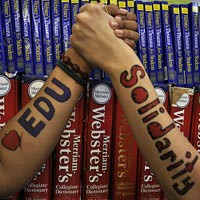Learning from veteran activists
I’m proud to stand in solidarity with the Failing Schools Project. I was just thinking yesterday about how this endeavor has been going strong for about a year when I saw Sabrina post her FSP Happy Birthday notice. Although I wasn’t present yet when the project was born (are we now in infancy, toddler-years, or adolescence yet?) it’s been empowering to cooperatively build alternative narratives and ideas together as the effort has grown.
While organizing in and outside schools with teachers, parents and community members, I’ve learned a tremendous amount about building awareness in the attempt to mobilize people to action. In the spirit of learning more about the complex process and challenges that go into organizing for justice in public education, I came to see Bill Ayers, who spoke last Thursday at State University of New York in Brockport.
I hadn’t been around a crowd of mostly student teachers and education majors for a good period of time, so this was interesting for me. The lecture was viewed by some as controversial due to Bill Ayers’ history of radical activism. However, Ayers explained how he had come to terms with his past actions. When asked, he described a period of time that could be viewed as overly dogmatic and misguided in his personal history of activism. He clearly and honestly expressed understanding of his actions in the Weather Underground. His focus in the present is on education reform and advocacy for vulnerable children. I can certainly appreciate Ayers’ willingness to reach in a different direction as a sign of atonement for imperfect routes in life. As always, we at Failing Schools support learning from incredible educators and community activists while strongly supporting non-violent resistance.
One truth that Ayers delivered was his explanation of how we progress and learn as human beings. He stated that first, we have to open our eyes and become conscious of what is going on around us. After gaining some initial consciousness of the ethical questions around us, our next step is to become active. Ayers described how crucial questioning and action is, as many engage in theory and thought without connecting their analysis to practice and conscious action. The third step is to doubt. Ayers described how reflection and assessment of our actions as individuals and organizations is required in order to build meaningful progress. Otherwise, we run the risk of becoming dogmatic and narrow-minded in our thinking. Ayers delivered a personal understanding of how lack of doubt and lack of self-assesment had led many, including himself, down lines of reasoning that could have used scrutiny. The last portion to this lesson was to continually repeat this process in order to grow, progress, and fight for justice. Ayers stated,
We are all blind people who can see; we are all seeing people who are blind…So when I say open your eyes, I don’t mean once or for a minute. I mean continually. There’s always more to know, more to see. And as soon as you are satisfied that you can see everything, then you are dead as a seeing person
One theme which Ayers powerfully described was a curriculum of questioning, and moreover the worth of education for critical thinking. The term critical thinking, while frequently thrown around in “eduspeak” circles, was clearly presented in Ayers’ discussion. He presented several questions about the nature of learning from day-to-day items to the larger purpose of education questions.
Ayers brought up an interesting historic example from 1963 when Charlie Cobb from Student Non-violent Coordinating Committee wrote a proposal for a Freedom School. Charlie Cobb stated in The Mississippi Freedom School Curriculum (1964), “The black children of Mississippi have been denied many things: decent facilities, forward-looking curriculum, fully trained teachers, but the fundamental injury is that they’ve been denied the right to think for themselves about the circumstances of their lives and how they might be otherwise.” Ayers illustrated the power of such forthright thought and questioning as Cobb asked, “Why are we in the Freedom Movement? What is it we hope to accomplish? What is it we have that we want to keep? What does the majority culture have that we would also like?”
These questions and the need for a curriculum of questioning is as relevant and meaningful now as it was in 1964. Having our manner of questioning explicitly or implicitly injected into our everyday actions is transformative and compelling. As we tackle education as an approach to community organizing in and out of itself, Ayers’ knowledge will certainly prove useful.
After the lecture and participant questions, I got a chance to touch base with Bill. We spoke about the growing struggle against privatization in education and also shared in lamenting Jean-Claude Brizard’s entrance into the Chicago Public School system. We also exchanged knowledge about our common allies in the Caucus of Rank-and-File Educators (CORE) in the Chicago Teachers Union. I’ll be sure to cross paths in Chicago with this visionary in the future as there is much to be learned from his views on education and activism.





Trackbacks